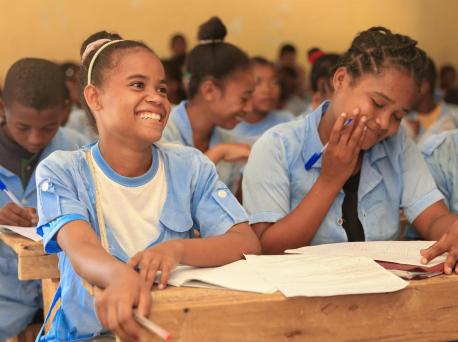
Keeping Girls in School in Madagascar
Fifteen-year-old Soavazaha (above, left) loves math and physics. She's one of the top students in her class in Amboasary, in the Anosy region of Madagascar.
"I like to fix our lights and my phone charger. I know how to do that," she says. "I don't have to wait for a man to fix it. As a woman, it's up to me to study physics so I can fix the light."
But poverty, early pregnancy and child marriage force many girls in Madagascar to drop out of school before they're Soavazaha's age. About 90 percent of the population survive on less than $2 a day. Forty-one percent of the country's young women between the ages of 20 and 24 were married before their 18th birthday — the world's 13th highest rate of child marriage.
Let Us Learn Madagascar, a UNICEF initiative supported by Zonta International and other donors, tackles issues of gender equity in Madagascar and supports adolescent girls so they can stay in school longer and avoid pregnancy and marriage until they are older.
Aimed at girls between the ages of 10 and 18, Let Us Learn includes a two-month life skills program conducted by Young Peer Educators. The training builds self-awareness and covers issues like environmental protection, violence against women and the exploitation of children.
"The life skills program helps us as teenagers," says Soavazaha. "It helps us to face situations in life. It gives us more knowledge. When I grow up, I'd like to be a doctor. I'd like to be the one to honor my family, to be able to help family members who are sick."
For more than 70 years, with your generous support, UNICEF has been putting children first, working to protect their rights and provide the assistance and services they need to reach their full potential.
Top photo: Students in Madagascar — including 15-year-old Soavazaha, left, who goes to school in Amboasary, a town in the Anosy region — participate in a life skills program supported by UNICEF's Let Us Learn initiative. © UNICEF/UN0300016/Ralaivita
HOW TO HELP
There are many ways to make a difference
War, famine, poverty, natural disasters — threats to the world's children keep coming. But UNICEF won't stop working to keep children healthy and safe.
UNICEF works in over 190 countries and territories — more places than any other children's organization. UNICEF has the world's largest humanitarian warehouse and, when disaster strikes, can get supplies almost anywhere within 72 hours. Constantly innovating, always advocating for a better world for children, UNICEF works to ensure that every child can grow up healthy, educated, protected and respected.
Would you like to help give all children the opportunity to reach their full potential? There are many ways to get involved.



